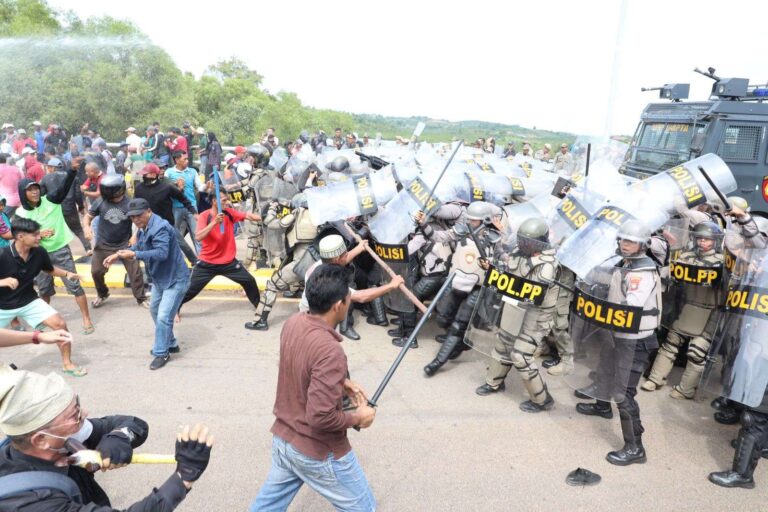JAKARTA — Indonesian civil society groups are challenging a controversial law they say enables forced evictions, weakens environmental protections, and encourages elite-driven megaprojects at the expense of ordinary citizens. Two major coalitions of NGOs and affected individuals have filed separate lawsuits with the Constitutional Court. Both suits, known as judicial reviews, tale aim at Indonesia’s sweeping 2020 “omnibus law,” which critics say facilitates environmentally harmful and socially unjust megaprojects across the country. The omnibus law, formally the Job Creation Law, was introduced by then-President Joko Widodo as a deregulation package intended to attract investment. Passed in October 2020, it amended more than 70 existing laws covering sectors such as labor, environment, and business licensing. Despite near-universal opposition from environmental groups, labor unions, academics and students, the government pushed the law through parliament in just 167 days, during the height of the COVID-19 pandemic. Critics warn it rolled back protections for workers and the environment in favor or business interests. In 2021, the Constitutional Court ruled the law “procedurally unconstitutional” because of the way it was rushed through, citing a lack transparency and public consultation. Instead of scrapping the law, however, Widodo issued a regulation to reintroduce it. Parliament ratified this version in March 2023 — effectively relegitimizing a law previously deemed unconstitutional, and reigniting legal and civil society opposition, including the two new judicial reviews. Former Indonesian President Joko Widodo started his second day of visit in the Nusantara capital city by directly reviewing the Presidential Palace area, on Monday morning,…This article was originally published on Mongabay
Search
Recent Research
Want your Blog Article featured on our website?
Research
Featured News
Explaining Katsina’s Massive Leap to 2nd Position in the 2025 Climate Governance Ranking
In 2024, during the first edition of the Subnational Climate Governance Performance Rating and Ranking,
COP30: Firm to connect institutions with international climate finance opportunities
SISTME, a climate change and biodiversity conservation consulting firm based in Argentina, has offered to
From resistance to planetary governance, Indigenous women redefine global climate action
While world leaders negotiate behind closed doors in the Blue Zone of COP30, Indigenous Women
Sahara Group Foundation launches 16th Sahara Go Recycling Hub to boost environmental sustainability, economic empowerment
Sahara Group Foundation, the corporate social impact arm of Sahara Group, has commissioned its 16th
Climate finance is the lifeblood of climate action – Simon Stiell at COP30
Remarks delivered by UN Climate Change Executive Secretary, Simon Stiell, at the third High-Level Ministerial
UNDP, REA, GEF commission Plateau solar mini-grid to power agricultural value chains, empower rural communities
The United Nations Development Programme (UNDP), in partnership with the Rural Electrification Agency (REA) and
COP30: Africa urges world leaders to turn pledges into action
Africa has called on the world leaders to turn their pledges into action regarding the
Thousands join global marches calling on govts at COP30 to deliver climate justice
An estimated 30,000 people marched through the Brazilian city of Belém on Saturday, November 15,


